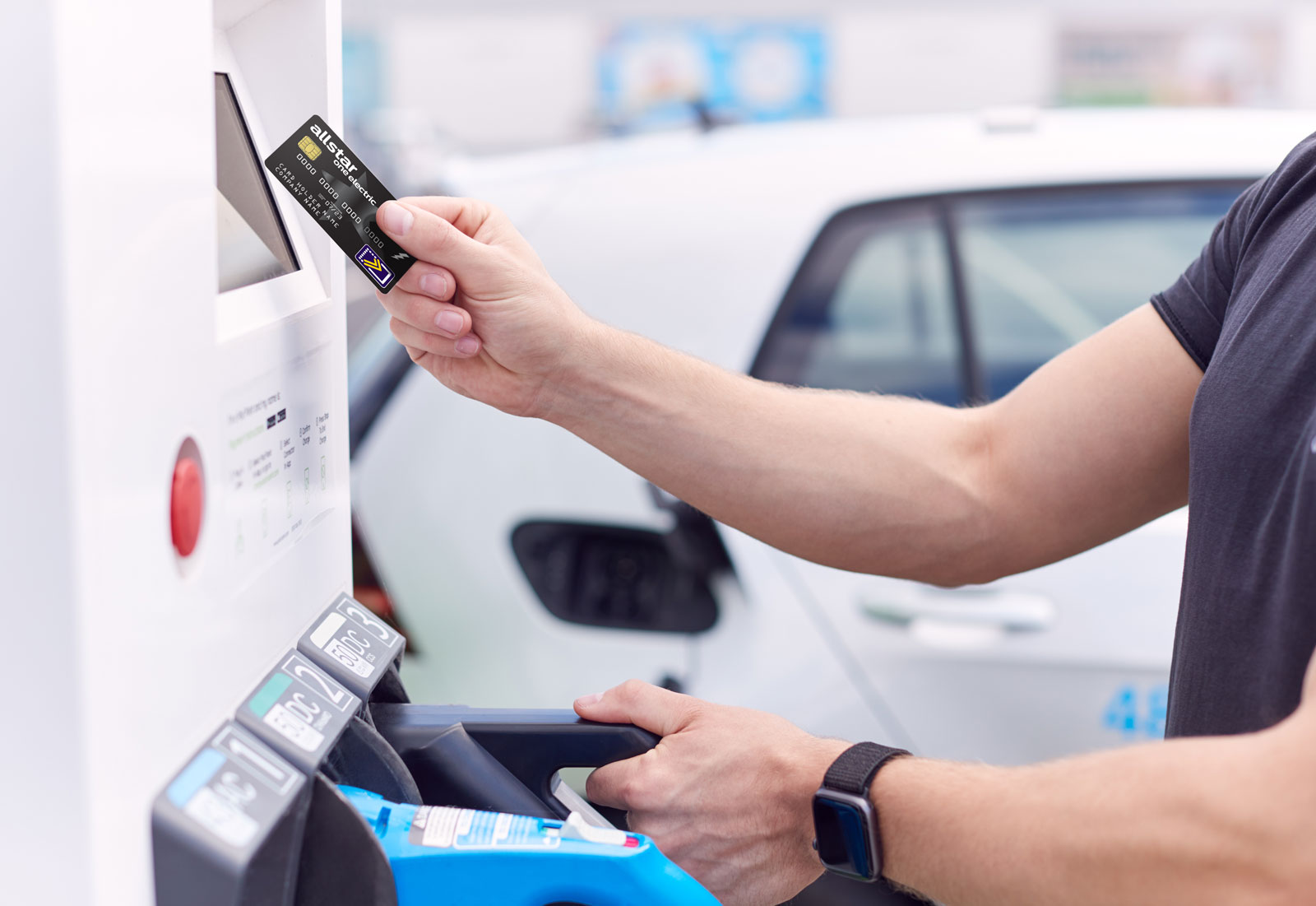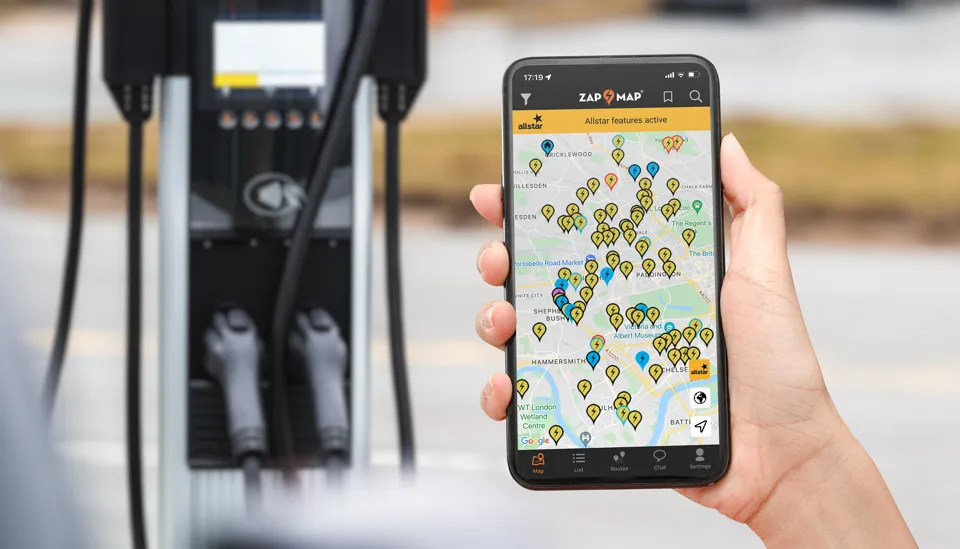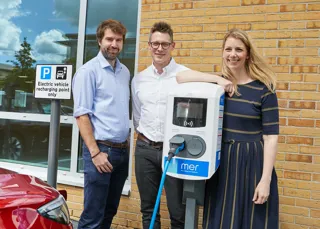Fleetcor has revealed that more charge point operators (CPOs) are in the pipeline to join the Allstar network as it also plans to develop its app further to cater for mixed fuel fleets.
Tom Rowlands, managing director (MD) of global electric vehicle (EV) solutions at Fleetcor, Allstar Business Solutions’ parent company, says it currently has 14 CPOs on the network.
However, he added: “We have some really exciting CPOs weeks away from launching, which is really going to change the face of our network and really give us a competitive edge.”
Allstar’s aim is to have 12,000 charge points on the network by the end of this year, which will give it more than a third of the market.
Allstar One Electric currently provides users with access to more than 5,700 charge points in over 2,200 locations nationwide, including 1,800 rapid and 3,500 fast chargers.
However, Rowlands said: “What we're really focused on is not numbers, it's rapid and ultra-rapid, because that's what fleets want.
“Fleets don't want a seven kilowatt or three-kilowatt charger in a Tesco supermarket.”
In terms of its app, the business is work working with Zap-Map, which means customers are currently able to log the Allstar card into Zap-Map, and then only see sites that work with its payment card.
Customers can also use the app to pay some providers via their mobile, while other sites will direct you to use Allstar's RFID card.
“Of those 14 (CPOs), I think, at the moment, we can do two or three via mobile payment and we're planning to obviously bring that up,” said Rowlands.
However, he says Allstar is looking to develop its app further so its traditional fuelcard app and EV app can be combined to cater for mixed fuel fleets.
Broader EV offering for fleets
Fleetcor launched its Allstar One Electric card in 2019, but Rowlands says it quickly realised that there were further opportunities in looking at home-charging, the installation of devices and the hardware.
He explained: “If you look at the lifecycle of someone coming into an EV, effectively, the first thing that they will ask is 'what hardware do I need? Where do I need it, how do I get it and how much is going to cost me?
“While we don't want to be a core player in selling hardware or doing installations, we needed solid partners.”
Rowlands acknowledges that the “upfront consultative sell and consultative process” was new to Fleetcor, but he says “we found some really interesting players and partners in that space”.
He added: “We worked with Diode, who help customers with diagnosing their fleet, looking at their fleet today, looking at the trends of the drivers, and trying to bust some of the myths that the drivers might have.”
Allstar offers a white-labelled version of Diode for its customers and also has partners in the hardware and installation sectors, enabling site surveys to be done as well as installations.
“All of that comes before you even really get into our core business, but it's a super important part of the process for the customer to get them up and running,” he said.
The core business is its fuelcard offering. “The product on road is twofold,” he continued. “There's a physical RFID card, but it's also a driver app, which becomes far more important with an EV than with a universal fuelcard, because you can go anywhere.
“What the RFID card does is aggregate disparate CPOs (charge point operators) in the UK market so that people don't have to have 10 different apps to be able to go in and charge up around around the UK.”
In terms of home-charging, Fleetcor has completed two rounds of investment into EV charging payment start-up Mina, with Rowlands now sitting on the board of that business, and has launched the Allstar Homecharge solution.
He explained: “When they get their piece of hardware at the home, we onboard them onto the Allstar Homecharge solution, which means we're able to see that kilowatt hour information, we also through that onboarding process, understand who their energy provider is and we're then able to automatically pull the information from the charging.
“Every month, we then directly pay the utility company, and that gets credited on to the bill, so the driver is never out of pocket. Then we consolidate all of that for however many drivers and invoice the fleet at the end of the month for the money we've paid back to the utility companies.”
Rivus deal to help electrify fleet

Rivus, has signed a deal with Allstar for its Allstar One Electric card and Allstar Homecharge solution to make charging payments simpler for EV drivers both at home and on the road.
Rivus and Allstar Business Solutions, will allow Rivus customers to access Allstar’s growing multi-branded electric charging network to simplify the transition to zero carbon, through Rivus’ Electric Vehicles as a Service (EVaaS) proposition.
For Rivus customers, the Allstar One Electric combines fuel and electric for a one-stop-shop for vehicle fleets of all sizes during their transition to EV.
Simplifying this into one solution ensures ease for the driver as well as a consolidated view for the fleet operator, it says.
Fleet drivers with an Allstar One Electric card will be able to use it in multiple public charging networks, as well at over 90% of fuel sites, making it ideal for the entire fleet.
Sarah Gray, head of alternative fuel vehicles at Rivus, said: “Charging can be one of the most complicated parts of running an electric fleet. With multiple public EV charging networks and apps, different home charge point manufacturers and driver reimbursement options, it is a lot to manage.
“Coordinating this can be a challenge and can potentially impact the transition to EV for many businesses.
“We identified through our consultation, that Allstar’s EV charge card and charging solutions can manage this for you. We are really pleased to partner with Allstar and offer this as part of our ongoing strategy to support the adoption of and transition to EV.”
Laura Lancaster, VP of EV sales and partnerships at Allstar Business Solutions, added: “We’re pleased to partner with Rivus to help fleets transition to EV and simplify charging at home and on the road.
“We do this by providing businesses visibility of home and on the road charging across their fleet, with all charging costs coming through on one consolidated invoice, reducing administration for businesses and driver.”
She continued: “We have further simplified charging on the road with the ability for the Allstar One Electric card to be added as a payment method in the Zap-Map app, giving drivers enhanced features to search, plan and pay for charging across the Allstar electric charging network.”
Data collected will be shared with Rivus to help build data insights to advise their customers on achieving greater efficiencies across their EV fleets. This can be broken down by network, driver or vehicle for cost management, invoicing and data gathering.
> Interested in comparing electric vehicle data? Check out our EV tool.
> Interested in ensuring the efficient use of EVs. Check out our dedicated editorial sections: Insight & policy | EV news | Charging & infrastructure | Costs & incentives | Benefit-in-kind | EV case studies | EV road tests























Login to comment
Comments
No comments have been made yet.